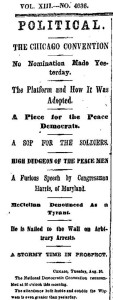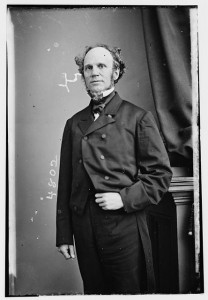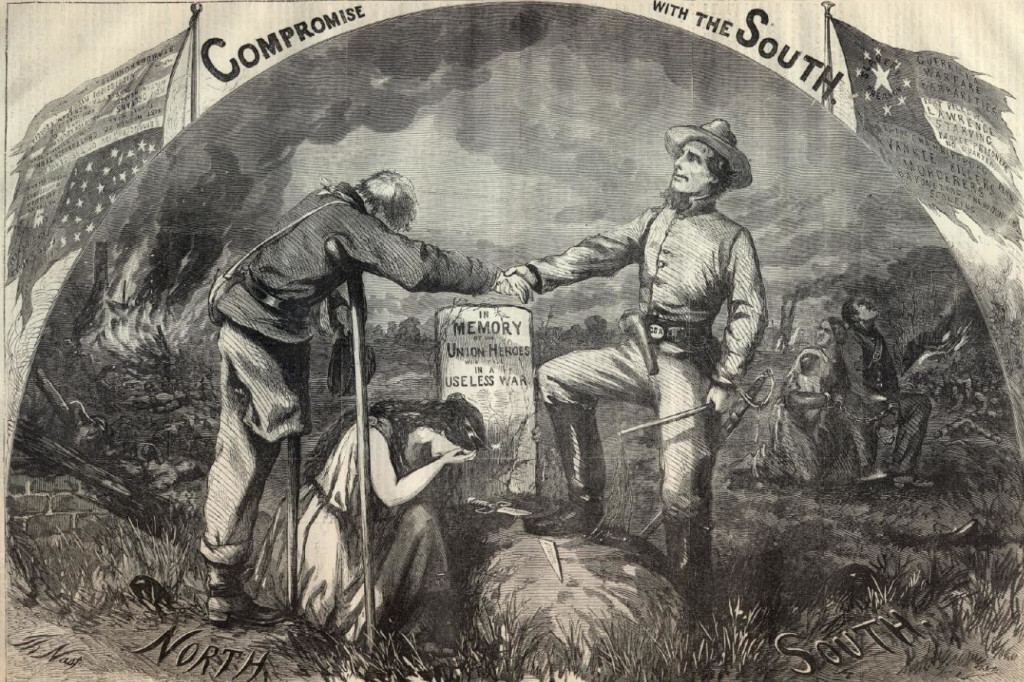although, maybe not on the floor of the Democrat convention
On the second day, the Democratic convention in Chicago adopted its platform for the 1864 campaign. The chairman of the convention, New York Governor Horatio Seymour, opened the day with a speech. A proposal to add an explicit States’ Rights plank to the platform was rejected as the reported resolutions were adopted. With the platform agreed upon nominations for the presidential candidate were entertained. After seconding the nomination of Thomas H. Seymour, Maryland Congressman Benjamin Gwinn Harris caused a ruckus by laying into previously nominated George B. McClellan for stomping on the rights of Marylanders while he was active as a Union general.
From The New-York Times August 31, 1864:
THE CHICAGO CONVENTION; No Nomination Made Yesterday. The Platform and How It Was Adopted. A Piece for the Peace Democrats. A SOP FOR THE SOLDIERS. HIGH DUDGEON OF THE PEACE MEN A Furious Speech by Congressman Harris, of Maryland. McClellan Denounced As a Tyrant. He is Nailed to the Wall on Arbitrary Arrests. A STORMY TIME IN PROSPECT.
CHICAGO, Tuesday, Aug. 30.
The National Democratic Convention reassembled at 10 o’clock this morning.
The attendance both inside and outside the Wigwam is even greater than yesterday. …
On taking the Chair, Governor SEYMOUR spoke as follows:
GENTLEMEN OF THE CONVENTION: I cannot forecasts the resolutions and action of this convention, but I can say that every member of it loves the Union, desires peace, and will uphold constitutional freedom. …
Four years ago a convention met in this city, when your country was peaceful, prosperous and united. Its delegates did not mean to destroy our Government, to overwhelm us with debt, or to drench our land with blood; but they were animated by intolerance and fanaticism, and blinded by an ignorance of the spirit of our institutions, the character of our people, and the condition of our land. They thought they might safety indulge their passions and they concluded to do so. They would not heed the warnings of our fathers, and they did not consider that meddling besets strife.
Their passions have wrought out their natural results. They were impelled to spurn all measures of compromise. Step by step they have marched on to results which, at the onset they would have shrunk with horror from; and even now when war has desolated our land, has laid its heavy burdens upon labor, and when bankruptcy and ruin overhang us, they will not have the Union restored except upon conditions unknown to our Constitution.
They will not let the shedding of blood cease even for a little time to see if Christian charity or the wisdom of statesmanship may not work out a method to save our country.
Nay, more than this, they will not listen to a proposal for peace which does not offer that which this Government has no right to [???]. [impose?] …
Gentlemen, I do trust that our proceedings here will be marked by harmony. I do earnestly believe that we shall be animated by the greatness of this occasion. In all probability the future destiny of our country hangs upon our action. Let this consideration inspire us with a spirit of harmony.
God of our fathers, bless us now ; lift us up above all personal considerations; fill us with a just idea of the great responsibilities which rest upon us, and give again to our land its union, its peace and its liberty.
Loud and enthusiastic cheers greeted Gov. SEYMOUR as be concluded his speech.
[At the 4 PM session the platform was adopted and then presidential nominations were accepted.]
Mr. HARRIS, of Maryland, seconded the nomination of THOMAS H. SEYMOUR, and proceeded to eulogize his party services and abilities. Mr. HARRIS continued as follows:
One man nominated here to-day is a tyrant. [Cheers and hisses.] He, it was, who first initiated the policy by which our rights and liberties were stricken down. That man is GEORGE B. MCCLELLAN. [Confusion.] Maryland, which has suffered so much at the hands of that man, will not submit to his nomination in silence. His offences shall be made known. This Convention is a jury appointed by the people to pass upon the merits of the public men whose names may be presented for the support of the great Democratic party. Gen. MCCLELLAN, I repeat, is a tyrant. [Great confusion.] He stood here to indict him.
A DELEGATE — I call him to order.
The President said that he hoped there was no man present who would deny the right of free speech. Certainly no Democrat will. At the same time he hoped that no delegate would feel called upon to pursue a course of remarks so offensive as to interfere with the harmony of the convention.
Mr. HARRIS read MCCLELLAN’s order of arrest against the Maryland Legislature, and proceeded to comment upon the same; but the confusion was so great that the speaker could not be heard, except to say that all the charged of usurpation and tyranny that can be brought against LINCOLN and BUTLER he can make and substantiate against MCCLELLAN.
[Hisses, cheers, and cries of “Vote for JEFF. DAVIS.”] …
The meeting was adjourned for the day as the delegates were still debating the merits of McClellan.
You can read the Democratic platform at the Richmond Daily Dispatch September 3, 1864:
The platform.
At the afternoon session of the Convention, on Tuesday, Mr. Guthrie, from the special committee to prepare resolutions, reported the following platform, which was adopted with only four dissentient voices:
Resolved, That in the future, as in the past, we adhere with unswerving fidelity to the Union under the Constitution as the only solid foundation of our strength, security and happiness as a people, and as the framework of a government equally conducive to the welfare and prosperity of all the States, both Northern and Southern.
Resolved, That this Convention does explicitly declare, as the sense of the American people, that after four years of failure to restore the Union by the experiment of war, (during which, under the pretense of military necessity or the war power, the Constitution itself has been disregarded in every part, and public liberty and private right alike trodden down and the national prosperity of the country essentially impaired,) justice, humanity, liberty and the public welfare, demand that immediate efforts be made for a cessation of hostilities with a view to an ultimate convention of all the States, or other peaceable means, to the end that at the earliest practicable moment peace may be restored on the basis of the Federal Union of the States.
Resolved, That the direct interference of the military authority of the United States in the recent elections held in Kentucky, Maryland, Missouri and Delaware, was a shameful violation of the Constitution, and the repetition of such acts in the approaching election will be held as revolutionary, and resisted with all the means and power under our control.
Resolved, That the aim and object of the Democratic party is to preserve the Federal Union and the rights of the States unimpaired, and they hereby declare that they consider the administrative usurpation of extraordinary and dangerous powers, not granted by the Constitution; the subversion of the civil by military law in States not in insurrection; the arbitrary military arrest, imprisonment, trial and sentence of American citizens, in States where the civil law exists in full force; the suppression of the freedom of speech and of the press; the denial of the right of asylum; the open and avowed disregard of States’ rights; the employment of unusual test oaths, and the interference with, and the denial of, the right of the people to bear arms, as calculated to prevent the restoration of the Union and the perpetuation of a government deriving its just powers from the consent of the governed.
Resolved, That the shameful disregard of the Administration to its duty in respect to our fellow-citizens who now are, and long have been, prisoners of war in suffering condition, deserves the severest reprobation and scorn alike of the public and common humanity.
Resolved, That the sympathy of the Democratic party is heartily and earnestly extended to the soldiers of our army who are, and have been, in the field under the flag of our country, and, in the event of our attaining power, they will receive the care, protection, regard and kindness that the brave soldiers of the Republic have so nobly earned.
I swapped the order of the last two resolutions in keeping with all the other sources.
The September 3, 1864 issue of Harper’s Weekly (at Son of the Southpreviewed the Chicago Convention and let it’s reader know what it thought about a Democratic peace with this image by Thomas Nast:



